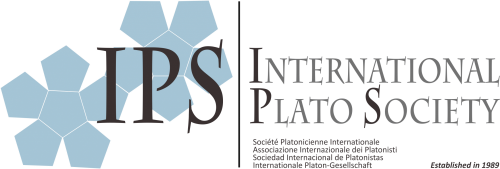The International Plato Society (IPS) is pleased to announce the colloquium “Plato’s heritage in historical perspective: intellectual transformations and new research strategies”, which will take place in St. Petersburg, Russia on the 28th and 30th of August 2018.
The colloquium will serve as a platform for the IPS Executive Committee’s mid-term meeting.
The study of Plato’s heritage is a way of diagnosing modernity – in so far as it is made explicit in philosophical discourse. This is precisely why intellectual transformations and new research strategies are relevant themes for both international and Russian Plato studies.
We propose the following topics for the colloquium:
- The history of Plato interpretation as an element of the evolution of European culture. Different periods and tendencies of interpretive programs. Schools of thought and intellectual trends which shaped and determined the study of Plato in the 19th and 20th centuries. The specifics of the study of Plato’s heritage in different disciplinary traditions such as classical philology or the history of philosophy. The role of Plato interpretation in various philosophical projects and the “turns” of European philosophy and culture. Plato in Russia.
- Contemporary strategies of studying Plato. The problems of the “Plato’s corpus”: its unity and its role in the context of the Academy, its educational program and the strategies of interaction with the outside, non-academic social world of Plato’s time. The perspectives for and the limits of the chronological approach to Plato’s texts. Problems relating to genre characteristics. The particularities of modern stylometric investigations.
- The experience of translating Plato into modern languages and publishing Plato’s texts. Problems of style and terminological accuracy. Commentary as an element of the translation and the publishing of a classical text. Typology of contemporary commentaries, structure and “plot organization” of existing contemporary Plato editions.
Institutions
The colloquium will be supported by the Herzen State Pedagogical University of Russia and the Russian Christian Academy for the Humanities. All meetings will take place in the historical center of St. Petersburg.
Organizing committee
Chairman of the organizing committee: Prof. Roman Svetlov (Saint Petersburg State University, Russian Christian Academy for the Humanities), chairman of the “Plato Philosophy Society”.
Co-moderators of the program organizing committee:
- Lead researcher, Editor-in-Chief of the “Platonic Investigations / Πλατωνικὰ ζητήματα” Irina Protopopova, PhD (Russian State University for the Humanities),
- Prof. Lev Letyagin (Herzen State Pedagogical University of Russia)
- Prof. Dmitry Shmonin (Russian Christian Academy for the Humanities),
- Prof. Igor Goncharov (Syktyvkar State University).
Members of the organizing committee:
- Dmitry Kurdybajlo (Russian Christian Academy for the Humanities)
- Irina Mochalova (Saint Petersburg State University)
- Elena Alymova (Saint Petersburg State University)
- Tatiana Litvin (Russian Christian Academy for the Humanities)
The publication of the colloquium materials
The texts of the colloquium will be published in our periodical “Platonic Investigations/ Πλατωνικὰ ζητήματα”.
Preliminary colloquium program
- Day 1 – two plenary sessions (11.00- 14.00; 15.00- 18.00; 3-4 reports per session), reception.
- Day 2 – the meeting of the Executive Committee of the Platonic society (11.00- 13.00) and plenary session (13.30- 18.00 – 5-6 reports).
- Day 3 – Sections sessions (11.00 – 18.00). 18.00 – closing remarks.
Procedure and deadlines
Please, send estimated titles of your papers (we are preparing preliminary program of Conference for institution’s officials in January).
Please send the abstracts (300-500 words, prepared for blind-review) by 1 May 2018 to plato.spb@gmail.com.
Working languages
The working languages of the conference are Russian and English. We propose that the participants send their papers in ahead of time, so that translations can be prepared and then displayed on a separate screen during the presentation.
The study of Plato in Russia
The first systematic translations of Plato’s heritage into Russian have been produced in the 18th century, however separate fragments translated into Old Russian appear in various florilegiums dating back to 12th-16th centuries. The differences in interpretation of Plato in Russia are connected to the different historical periods and the development of modern forms of education and science, particularly following the reforms of Peter the Great. The study of Plato in Russia has always had a philosophical, scientific and cultural importance. There exists a culturally ingrained myth of the “Platonism” of the russian soul, inclined to a contemplative kind of spirituality; a Platonism of a Christian “Byzantine” variety. Even during the Soviet Union the study of Greek antiquity, including Plato, continued even though it acquired a specific character.
Nevertheless, the institutionalization of these studies has only become possible in the 1990s. Since 1993 a yearly conference, “The universe of Plato’s thought”, takes place in St.Petersburg. Since 2012 yearly Plato conferences take place in Moscow. Both in St.Petersburg and in Moscow, a number of international Plato specialists have participated. In 2014 the “Plato Philosophical Society”, which closely cooperates with the IPS, has been officially registered. One of its main goals is to lay the groundwork for the publication of new Russian translations of Plato, amongst other things by facilitating the uptake of the rich international experience of analyzing and translating Plato. Since 2014 the “Plato Philosophical Society” publish a periodical “Platonic Investigations / Πλατωνικὰ ζητήματα”, a number of influential international Platonists among its authors and members of its Advisory Committee.
